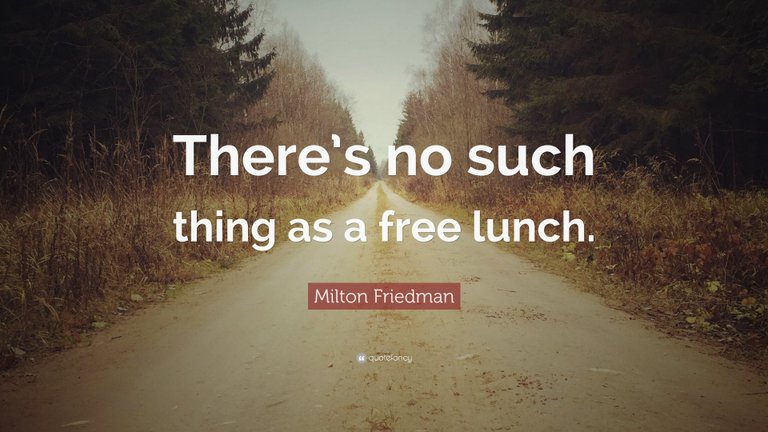Milton Friedman, there’s no such thing as a free lunch…
Friedman’s iconic words, bullshit or the hard truth?
Milton Friedman, an esteemed economist and Nobel laureate, left an indelible mark on economic theory and policy. Among his many contributions, one phrase stands out as a succinct encapsulation of his economic philosophy: "There’s no such thing as a free lunch."
This statement, often abbreviated as TANSTAAFL, has become a cornerstone of economic discourse, serving as a reminder of the fundamental principle of scarcity. But what did Friedman mean by it?

At its core, Friedman’s assertion underscores the idea that resources are limited, and obtaining something seemingly "free" always incurs a cost, whether visible or not. In other words, every choice has an opportunity cost. For instance, a complimentary meal at a restaurant may not require immediate payment, but it still involves the allocation of resources—ingredients, labor, and overhead costs—that could have been used elsewhere.
Friedman’s maxim extends beyond the realm of material goods. It applies to government policies, societal decisions, and individual actions. For instance, government subsidies for certain industries might appear beneficial on the surface, but they often come at the expense of taxpayers or other sectors of the economy. Similarly, personal choices, such as opting for a free service that collects user data, may entail privacy trade-offs.
Friedman's insight challenges the notion of something being truly "free" and emphasizes the importance of understanding the full implications of our decisions. It encourages a more nuanced consideration of costs and benefits, urging individuals and policymakers to weigh the unseen consequences alongside the immediate gains.

Another famous quote by Friedman
Critics of Friedman's perspective argue that some benefits, such as public goods like national defense or clean air, can indeed be enjoyed collectively without direct payment. However, even in these cases, resources are still expended to provide these benefits, typically through taxation or regulatory measures. In essence, Friedman’s message is one of mindfulness and accountability. By recognizing that everything has a cost, we become more discerning in our choices, striving for efficiency and sustainability in resource allocation. Whether applied to economics, politics, or daily life, his words serve as a reminder that true "free lunches" are rare—if they exist at all.
Milton Friedman’s declaration, "There’s no such thing as a free lunch," encapsulates a fundamental truth about the nature of resource allocation and opportunity costs. It prompts us to critically evaluate the implications of our decisions and to acknowledge that even seemingly costless benefits come with strings attached. In a world of finite resources, understanding the value of what we receive and the costs incurred is essential for making informed choices and fostering responsible stewardship.
Sincerely,
Pele23
@arunava
@arunava?
Thank you for your witness vote!
Have a !BEER on me!
To Opt-Out of my witness beer program just comment STOP below
View or trade
BEER.Hey @pele23, here is a little bit of
BEERfrom @isnochys for you. Enjoy it!Did you know that <a href='https://dcity.io/cityyou can use BEER at dCity game to buy cards to rule the world.
Inflation is only for the poor people, it is the rich people and those in the government, things are still cheap.